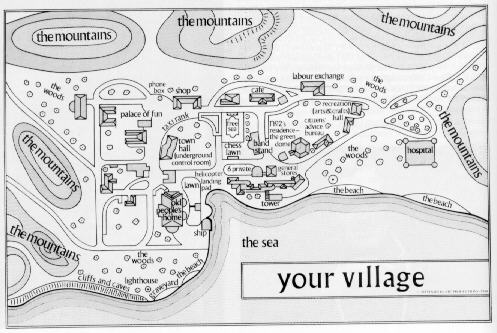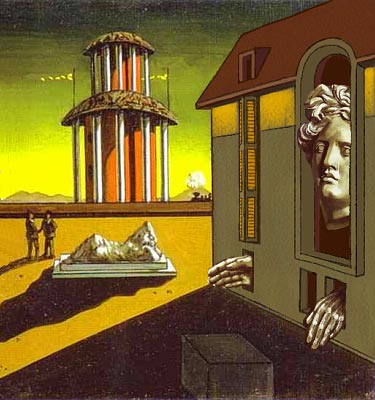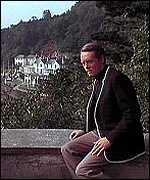August 31, 2004
PORTMEIRION: AN IDEAL FOR LIVING (What I did on my holiday, part 2)


'As the bourgeoisie laboured to produce the economic as a separate domain, partitioned off form its intimate and manifold interconnectedness with the festive calendar, so they laboured conceptually to re-form the fair as either a rational, commercial trading event or as a popular pleasure-ground. As the latter, the fair had from classical times been subject to regulation and suppression on both political and moral grounds. But although the bourgeois classes were frequently frightened by the threat of political subversion and moral licence, they were perhaps more scandalized by the deep conceptual confusion entailed by the fair's inmixing of work and pleasure, trade and play.
In so far as the fair was purely a site of pleasure, it could be envisaged as a discrete entity: local, festive, communal, unconnected to the 'real' world. In so far as it was purely a commercial event it could be envisaged as a practical agency in the progress of capital, an instrument of modernization and a means of connecting up local and communal 'markets' to the world market.'
Peter Stallybrass and Allon White, 'The Fair, the Pig, Authorship' in The Politics and Poetics of Transgression
If you know about Portmeirion, it's almost certainly because of The Prisoner, justly recognized as one of the most innovative television series ever produced (more on which presently).
Our tendency is to think of Portmeirion, built by gentlemen-philanthropist Sir Clough Williams-Ellis on his private peninsula near Porthmadog, as a quaintly attractive divertissement; an example of charming English eccentricity that has somehow fetched up in Wales.
The subtext we don't even need to articulate to ourselves (so we think) is that all this - attractiveness, eccentricity, charm - are harmless, which is to say, pleasant but ultimately irrelevant. The idea that they could have political-economic significance; that's more absurd than Ellis' absurdist architecture, surely?
It's fitting that I should have encountered both Ellis' village and Llandudno's homage to Lewis Carroll in the same week, in Wales, since both belong to an ex-centric Britishness that is as at least as important as Magritte's Belgian Surrealism.
Remember that Andre Breton thought that the British - with Edward Lear , Lewis Carroll and their ludic ilk - had little need of Surrealism, since they were already Surrealist. (Though it's always worth bearing in mind, when thinking of Breton, Iain Hamilton Grant's elegant put-down at Virtual Futures 94. Grant was incredulously pondering Jameson's formulation, 'Surrealism without the unconscious'. 'What would that be? Breton I suppose...' LOL) But Artaud, who could hardly have been accused of being over-conscious, was an admirer of Carroll; as were the Situationists, who recognized that there was something utterly serious about English Nonsense. As did Deleuze, of course, who produced what is one of the strangest landmarks in Psychedelic Reason, The Logic of Sense as a rigorous philosophical exposition of Carroll's Nonsense. (One of its most inciting sections is an account of Artaud's translation of 'Jabberwocky'.)
But it's worth pausing and thinking a little more about the Situationists. It's disastrous that the Situationist insistence upon the ludic has degenerated into a smugonautic celebration of bourgeois circus trickery (juggling and unicylcists as the shock troops of the revolution against Corporate Kapital). You have to reread Ivan Chtcheglov's astonishing Formulary for a New Urbanism - written in the year of our current Queen's coronation (attn: Robin Carmody), 1953 - to be reminded of the force of the Situationist critique. How could architecture - i.e. the places in which we live - not be an intensely political matter? And why should we live in boring, utilitarian spaces when we could live in grottoes and crooked caverns? 'A mental disease has swept the planet: banalization. Everyone is hypnotized by production and conveniences...'
Like punk, Surrealism is dead as soon as it is reduced to an aesthetic style. It comes unlive again when it is instantiated as a delirial program (just as punk comes unlive when it is effectuated as an anti-authoritarian, acephalic contagion-network). Chtcheglov resists the aestheticization of Surrealism, and treats De Chirico's paintings, for instance, not as particular aesthetic contrivances, but as architectural blueprints, ideals for living. Let's not look at a De Chirico painting ---- let's live in one.

Chtcheglov's call was astonishingly pre-empted by Clough Williams-Ellis' building of Portmeirion. Ellis described himself as follows:
'He almost certainly has a weakness for splendour & display & believes that even if he were reduced to penury himself he would still hope to be cheered by the sight of uninhibited lavishness & splendour unconfined somewhere which is why he feels that Copenhagen's Tivoli Gardens or something like them should be spread around the civilised world giving everyone a taste of lavishness, gaiety and cultivated design.'

Ellis recognized, that is to say, that the production of the aesthetic as a category separate from the 'necessary' (i.e. the utile, in the Bataille restricted economy sense) was complicit in a kind of (from any rational POV) inexplicable diminution of the possibilities of human experience. Why must architecture be part of a banalizing culture of vampiric undeath? Why should only the privileged be able to enjoy their surroundings? Why should the poor be penned into miserable concrete blocks?
Ellis referred to beauty as a 'strange necessity', cutting through the binary of needs = biological and aesthetic = cultural luxury. Bodies deprived of attractive surroundings were as likely to be as depressed - or to use the superbly multivalent Rasta term, downpressed - as those deprived of anything they more obviously 'needed'.
According to the Portmeirion website , Ellis sought, in the building of Portmeirion, to demonstrate that it was possible to develop sites of natural beauty without destroying them.
'A tireless campaigner for the environment Clough was a founder member of both the Council for the Protection of Rural England in 1926 and the Campaign for the Protection of Rural Wales in 1928 (and of which he was president for twenty years). He was an advocate of rural preservation, amenity planning, industrial design and colourful architecture.'
The fact that The Prisoner was filmed here then is in no sense an accident.

In addition to its Foucauldian analyses of power ('you are Number 1'), its - in every good sense - existentialism, its PKD-like psychedelic dismantling of identity, The Prisoner was a withering account of the English class system. McGoohan, auteur-actor was given an artistic licence by the then head of ITV (yes, remember, The Prisoner appeared on ITV - I know it beggars belief now), Lew Grade - both were outsiders (McGoohan an American-born Irishman, Grade a Jew) who had penetrated into the genteel brutality of the English Core's gentlemen's club.
However irascible they sometimes became, the series of Number 2's typically had that impermeable urbane assurance so infuriatingly characteristic of the English Core Master Class. Power expressed itself not in crude force - whenever that was used (cf the episode 'Hammer into Anvil') you knew that they had in every sense lost it - but with the quiet, insinuating menace lurking behind an inscrutable politesse. 'Cup of tea, Number 6?'
The village had all the quaint charm of politely ritualized Englishness ambivalently celebrated by The Kinks in their Village Green Preservation Society (which came out contemporaneously with the Prisoner). And of course McGoohan's genius lay in exposing the acidic undertaste of phrases like 'be seeing you' and 'feel free'.
The Prisoner is the heir of both Kafka and Carroll - and part of its importance consists in its revelation of the shared sensibility. Kafka's observations of the banalizing terror of the decaying Hapsburg bureaucracy as it moved towards Weberian impersonality owes much to Carroll. K's Trial after all has no more sense than the trial at the end of Alice's Adventures in Wonderland. Like Alice, K often comes across as a lucid child - for only a child can be lucid in Carroll and Kafka's world - observing the senseless and arbitrary cruelty of adult caprice, whose only alibi is precedent. 'Things have always been done that way. Don't you know? How stupid are you?'
It is their restoration of the child's reason in the face of adult intransigent baboonery that makes Kafka, Carroll and The Prisoner punk. Until it is socialized - i.e. stupefied into mute acceptance of the irrational caprice of the socius - the child knows that authority is nothing unless it is can be defended via reason.
The Prisoner, like Williams-Ellis, like the Situationists and the Surrealists, dream a dream deemed to be impossible, conceiving of a social system in which play and reason combine in an exploration of Intensive Now.
Posted by mark at August 31, 2004 08:13 AM | TrackBack